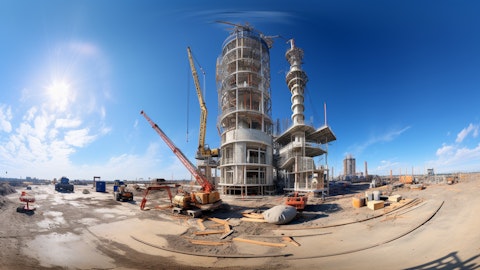GreenTree Hospitality Group Ltd. (NYSE:GHG) Q3 2024 Earnings Call Transcript November 21, 2024
Operator: Good day. And welcome to the GreenTree Hospitality Group Third Quarter 2024 Financial Results conference call. All participants will be in listen-only mode. Should you need assistance, please signal the conference. Please note today’s event is being recorded. I would now like to turn the conference over to Renee VanGestin. Please go ahead.
Renee VanGestin: Thank you, Rocco. Hello, everyone, and thank you for joining us. GreenTree’s earnings release was distributed earlier today and is available on our IR website at ir.998.com, as well as on P&L’s wire services. As a reminder, we also posted a PowerPoint presentation that accompanies our comments to the same IR website. On the call from GreenTree, I am joined by Mr. Alex Xu, Chairman and Chief Executive Officer, and Ms. Selina Yang, Chief Financial Officer. Mr. Xu will present the company’s performance overview for the third quarter of 2024. Ms. Yang will then discuss financials and guidance. They will be available to answer your questions during the Q&A which follows. Before we begin, I’d like to remind you that this conference call contains forward looking statements within the meaning of Section 21E of the Securities Exchange Act of 1934 as amended and as defined in the U.
S. Private Securities Litigation Reform Act of 1995. These forward-looking statements can be identified by terms such as “may,” “will,” “expect,” “anticipate,” “aim,” “future intent,” “plans,” “believes,” “estimates,” “continue,” “target,” “is likely to,” “going forward,” “confident,” “outlook,” and similar expressions. Any statements that are not historical facts, including those about the company and its industry, are forward-looking statements.Such statements are based on current expectations, market conditions, and operating conditions. They relate to events involving known and unknown risks, uncertainties, and other factors that are difficult to predict and often beyond the company’s control. These factors may cause the company’s actual results, performance, or achievements to differ materially from those expressed or implied in the forward-looking statements.You should not place undue reliance on these forward-looking statements.
Additional information regarding these and other risks, uncertainties, or factors is available in the company’s filings with the U.S. Securities and Exchange Commission.All information provided, including forward-looking statements made during this conference call, is current as of today’s date. The company does not undertake any obligation to update forward-looking statements as a result of new information, future events, or otherwise, except as required by applicable law. It is now my pleasure to introduce our Chairman and Chief Executive Officer, Mr. Alex Xu. Please go ahead.
Alex Xu: Thanks, Renee. Hello, everyone, and thank you for joining us today. I am pleased to report that our hotel business improved in the third quarter over the first two quarters of this year. As the economy continued to recover, travel patterns have normalized following last year’s surge, which has influenced year-over-year comparisons. We are back to a more positive environment, focusing on growing our pipeline and upgrading numerous hotels across our portfolio. We are confident that we are on the right track and will benefit from the ongoing stimulus measures implemented by the government.

Operator: Our restaurant business net income remained positive for a second consecutive quarter as we continued to grow the number of franchised street stores and stores with stable consumer traffic.
Alex Xu: Street stores now accounted for 55.5% of the store count compared to 44.6% a year ago. Following the closing of unprofitable stores over the past year, the number of restaurants in operation stabilized at 182 at the end of the quarter. We are now focusing on growing that number. Please turn to Slide 5. Compared with the third quarter of 2023, hotel RevPAR was 135 RMB, a decrease of 13.6%, and restaurant ADS was 4,891 RMB, a decrease of 25.6%. Total revenues were 357 million RMB, a decrease of 22.5%. Hotel revenues were 286.9 million RMB, a decrease of 15.4%, mainly due to a 13.6% year-over-year decline in RevPAR and the closure of older hotels, partially offset by new openings. Income from operations decreased to 106.4 million RMB with a margin of 29.8%.
Net income was 65.2 million RMB, a decrease of 44.4%, with a margin of 18.3%. Adjusted EBITDA (non-GAAP) was 122.5 million RMB, a decrease of 32.1%, with a margin of 34.3%. Please turn to Slide 6. Slide 6 shows detailed numbers for total revenues, income from operations, net income, and adjusted EBITDA. Slide 7 shows the trend in our quarterly operating performance. In the third quarter, compared to a year ago, RevPAR for our LO hotels decreased by 7.5% to 196 RMB, while RevPAR for our FM hotels decreased by 13.8% to 133 RMB. ADR for our LO hotels decreased by 3.6% to 258 RMB, and ADR for our FM hotels decreased by 6.1% to 179 RMB. Occupancy at our LO hotels decreased to 75.9% from 79%, and occupancy at our FM hotels decreased to 74.6% from 81.3%.
Slide 8 highlights the growth in our membership programs, which accounted for most of our direct sales. Individual memberships grew to 100 million, up from 88 million a year ago, and corporate memberships grew to 2.1 million, up from 2 million a year ago.
Selina Yang: Next, I will review operating and financial highlights. Please turn to Slide 16. In the third quarter, total hotel revenues decreased 15.4% to 286.9 million RMB compared to the third quarter of 2023. Total revenues from LO hotels were 118.2 million RMB, a decrease of 22.2% year-over-year, primarily attributable to a 7.5% year-over-year decrease in RevPAR and the closing of six hotels. Revenues from FM hotels decreased 9.7% to 167.9 million RMB, primarily due to a 13.8% decrease in RevPAR, partially offset by new openings. On Slide 17, total hotel operating costs and expenses decreased 4.9% year-over-year to 201.9 million RMB. Please turn to Slide 18. Income from hotel operations decreased from 106.4 million RMB to 99.5 million RMB year-over-year.
Net income was 58.6 million RMB compared to 108.5 million RMB in the third quarter of 2023. Adjusted EBITDA decreased 32.8% to 110.5 million RMB, and core net income decreased 21.4% to 86.9 million RMB year-over-year. We will now open for questions.
Q&A Session
Follow Greentree Hospitality Group Ltd. (NYSE:GHG)
Follow Greentree Hospitality Group Ltd. (NYSE:GHG)
Receive real-time insider trading and news alerts
Operator: Thank you. If you are using a speakerphone, we ask that you please pick up your handset before pressing the keys. To withdraw your question, please press star, then two. Our first question today comes from Kevin Wong with Piper Capital. Please go ahead.
Kevin Wong: Good evening. Thank you for taking my question. I have two, if I may. The first one is about the trend of the industry. How does the company’s performance in the third quarter compare to other peers? And my second question is about the restaurant business. It seems that the business turned profitable in Q2 and improved further in Q3. What do you expect for Q4?
Alex Xu: Okay, Kevin. This is Alex. Thanks for those two questions. In terms of the trend in the hospitality industry, we have compared like-to-like, and our portfolio has a higher percentage of aged legacy hotels. As a result, our RevPAR impact during the downward trend is more severe compared with newly opened hotel portfolios. However, we noticed that our newly opened hotels have performed much better than the legacy hotels. We have a track record of twenty years, which means we have accumulated more legacy hotels. Therefore, the downward pressure is more noticeable after mid-August. However, in October, we happily observed an improvement in occupancy trends. We expect that the fourth quarter will perform better than the third quarter.
With more new hotels being added to our portfolio, we believe the trend will reverse, and we will outperform the industry average within one to two years, especially with our substantial new products coming online. On the restaurant side, we have worked very hard to reposition our business model. In the past, many of our stores were located in supermarket-anchored shopping malls, which experienced a severe drop in foot traffic. A substantial number of those stores were closed and repositioned into street stores. Secondly, we improved our supply chain. The restaurant business model relies on foot traffic, the supply chain, and the management system. As a result, we have performed better than the industry average in the restaurant chain side.
We are happy to see continued profitability and will continue selecting new locations to add stores at our own pace to ensure that profitability can be sustained. We aim to have all business segments contributing to the bottom line. So, Kevin, this is the trend for both the hospitality and restaurant businesses. While we remain cautiously optimistic, we will keep delivering more value to meet consumer demand at affordable prices.
Kevin Wong: Very clear. Thanks.
Operator: Thank you. Our next question comes from Betty Udew with UBS. Please go ahead.
Betty Udew: Thanks, management, for giving me this chance to ask questions. I also have two questions. The first is, could you give us more color on your expectation for the supply-and-demand landscape going forward? Will rapid supply expansion continue in 2025? My second question is, what measures is the company planning to take in the next one to two years to further improve RevPAR and meet current macro conditions? Thank you.
Alex Xu: Thanks, Betty. The industry’s competition has intensified significantly. However, we are entering a more normalized period. Last year, there was a big surge post-pandemic. This year, we are seeing a normalized competitive environment. There are more new hotels and brands on the supply side, while demand has not fully caught up. As a result, there is downward pressure on RevPAR across the industry. For our LO hotels segment, the pressure is less than on our franchise hotels, as the latter include many older properties. We are confident that our new products in new locations will be more competitive, and we expect better performance in 2025 for both RevPAR and hotel openings. We have many new hotels in the pipeline, not only in tier-three cities but also in tier-two cities, particularly regional economic centers and provincial capitals.
These new hotels will enhance our presence in those regions and help improve the performance of our tier-three city hotels. Overall, we are optimistic about our 2025 outlook and performance. Regarding RevPAR, as I mentioned earlier, we see improvements in Q4 of this year. However, predicting travel patterns for next year is challenging given the current economic environment. That said, GreenTree’s business model remains resilient. While second- and third-tier cities yield lower RevPAR compared to first-tier cities, they have higher profit margins due to lower rents and personnel costs. This gives our franchisees more room to grow and enables us to withstand market fluctuations better.
Betty Udew: Thank you. That is very clear.
Operator: Thank you. Our next question today comes from Leewen Li with China Securities. Please go ahead.
Leewen Li: Thank you for taking my question. I have two questions. The first is about the OTAs. In Q3, we still see strong double-digit growth in OTAs despite the challenges. What do you think about the bargaining power of the hotel side versus OTAs in the future? My second question is about your investment in the Guizhou Province project. Could you share some color on this project?
Alex Xu: Thank you, Leewen. Regarding OTAs, their strong double-digit growth reflects the shift from offline to digital. It does not necessarily indicate an overall increase in hotel demand but rather a redistribution of market share. We are working closely with reputable OTAs. As long as it is mutually profitable and commissions remain affordable, this creates a win-win situation. With younger consumers relying more on digital platforms, we are adapting to these trends and enhancing our collaboration with OTAs. Regarding the Guizhou project, we are working with strategic partners in the four- and five-star hotel segments. The local government sought our help in repositioning and reopening a non-performing asset, which is ideal for a showcase four- or five-star hotel. We are happy to collaborate with them and look forward to reopening this project in the near future.
Operator: Thank you. Our next question comes from Victor Lee with DMHY. Please go ahead.
Victor Lee: Good evening. Thank you for taking my question. I have two questions. The first is about dividends. Dividends were announced in Q2, but Q3 performance was lower than expected. Do you plan to continue paying dividends in the future? My second question is about liquidity. What steps are you taking to improve liquidity in the capital market, and is there a timetable for these efforts?
Alex Xu: Thanks, Victor. Regarding dividends, while Q3 performance showed a decline of 44%, we are confident in our fundamentals. As Selina mentioned earlier, 33 million RMB of the decline is due to a foreign currency exchange loss, which is a paper loss. Additionally, there was an 11 million RMB bad debt provision for long-aged accounts receivable. We believe a significant portion of these receivables will eventually be recovered as franchisees improve their performance. We also see improved performance from newly opened hotels. Going forward, we expect operating income and EBITDA to improve significantly. Therefore, our dividend policy will remain unchanged, and we will continue as planned. Regarding liquidity, we are undergoing a reorganization in which the parent company will merge with GHG.
This will enable some current shareholders to become direct shareholders of GHG, increasing liquidity. While there are approval processes involved, we remain on schedule and optimistic about boosting liquidity in the long run.
Victor Lee: Thank you for your answer.
Operator: Thank you. If there are no further questions, this concludes our question-and-answer session. I would like to turn the conference back over to Selina Yang for closing remarks.
Selina Yang: Thank you all for your participation today. On behalf of the entire GreenTree management team, we thank you for your interest in GreenTree and your time. If you have any further questions, please feel free to contact us.
Operator: Thank you. This concludes today’s conference call. You may now disconnect your lines. Have a wonderful day or evening.
Follow Greentree Hospitality Group Ltd. (NYSE:GHG)
Follow Greentree Hospitality Group Ltd. (NYSE:GHG)
Receive real-time insider trading and news alerts





